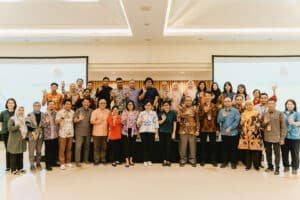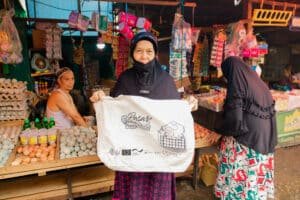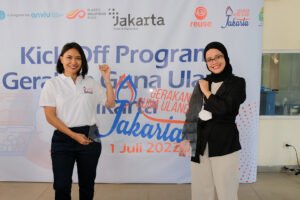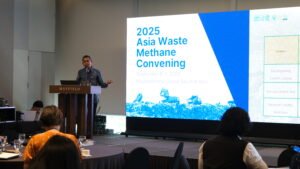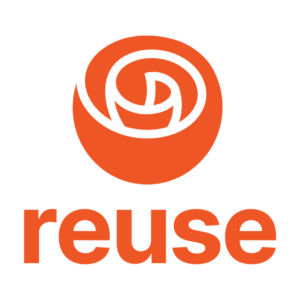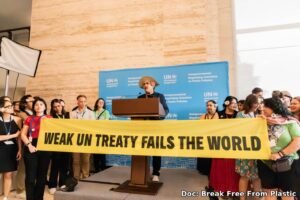Allas, one of the ventures of Zero Waste Living Lab by Enviu, is collaborating with new merchants by talking to friends from communities, start-ups, and other NGOs. This is also a way to increase public awareness of reuse solutions. How did Allas become a replacement for single-use plastic containers in food delivery services? Let’s see the twists and turns of the story!
Seeing People’s Readiness to Switch to Reusable Packaging Containers

GIDKP and Enviu held training and discussions on reusable packaging in the food and beverage industry.
Laurencia Cindy, Co-Founder of Allas, categorizes the public to switch to a reuse lifestyle into three groups. The first is group A, a group where people are already aware of the practice of reuse. Then group B is a group that has started to be aware and is transitioning, for example, people who carry tumblers even though the goal is to save on beverage purchases. However, they have not realized it; they have also helped prevent single-use plastics. Then the last is group C, where people still need to be made aware because they tend to be more inclined to look for more accessible options, and there is no encouragement of facilities from the government.
Currently, the food and beverage business is very prevalent in Indonesia. Not stopping at just selling food and drinks, business firms and people today have strategies to create significant sales. For example, they make attractive packaging so consumers want to publish it on social media. This is a sales strategy that is currently widely used. “Often, consumers also have no choice when ordering at a restaurant because consumers only accept what is provided by the restaurant. Therefore, the wise choice is more for producers/restaurants who can sort out the packaging they provide. Because many people are already aware and want to start changing their habits, this can be one of their added values and branding if the producer/restaurant chooses to use environmentally friendly packaging or reuse.” Cindy said.
The community has many benefits if they switch to a reuse lifestyle, such as reducing costs. Without people realizing it, for example, bringing their own drink/tumbler, they don’t need to buy drinks anymore; if they get their own reusable bag, they don’t need to purchase shopping bags anymore because they will only be stacked at home for a long time, bringing lunch with their container, so they don’t need to buy more food outside. All of this can also reduce disposable waste without realizing it.
Allas as a Reuse Solution

Ready-to-eat food using Allas containers
Allas is a provider of returnable food and beverage packaging containers. Allas can lend its packaging to replace single-use packaging (returnable and reusable) for offline and online orders. Not only lending the containers, Allas will also wash the containers that consumers have used. The food containers are made of silicone, and the drink containers are made of stainless steel.
There are currently two ways to collaborate with Allas: the restaurant contacting Allas or Allas contacting the restaurant; after that, a meeting, sharing, and review will be held. If there is approval, Allas will send stock containers and launch them on Allas and the restaurant’s social media. That the two are collaborating.
Prospective consumers who want to use Allas can register on the Allas website (www.Allas.id). Consumers confirm the registration via WhatsApp Allas – pay the membership fee – and get a user ID. Meanwhile, for events, you can contact Allas via WhatsApp and coordinate the container delivery to the vendor the consumer wants to use.
To return the Allas container, you can pick it up directly to the consumer’s house, who will be reminded to pick it up every Thursday or return it to the restaurant or merchant. Containers can be returned within a maximum of 14 days for personal use, while for events, the maximum return is three days after the event.
In running his business, Allas experiences several supporting and inhibiting factors. One of the supporting factors is awareness from community friends, start-ups, and NGOs (Non-Governmental Organizations), which really help Allas, as well as support from the government (regulations and road maps). Meanwhile, the obstacles experienced by Allas in running his business are Allas’ loan prices, which must compete with single-use prices because he will collaborate with restaurants whose primary focus is a profitable business, awareness from people who are not yet aware or restaurants who do not want to switch to reuse solutions.
Safety of Reusable Food and Beverage Containers Allas
To ensure the hygiene of the containers used, Allas always meets the standards set to comply with the regulations made by the Ministry of Health. “For the washing system, Allas currently uses guidelines/standards issued by the Ministry of Health, which are also used in restaurants or hotels regarding the shape of the building, pH of the water, soap, which is Allas’ reference, and a closed place for storing the container. “Apart from that, Allas is implementing the procurement of a commercial dishwasher where food and drink containers will be washed at high temperatures,” Cindy said.
“Because the majority of Allas users are people who are aware of the practice of reuse, which has also been used for a long time, consumers already know about it. “However, Allas is trying to create a special page on the Allas website for how to wash and hygiene containers that have been washed by Ministry of Health references,” Cindy added.
Note:
This article was written as one of the outputs of a collaboration between Allas by Enviu, The Deutsche Gesellschaft für Internationale Zusammenarbeit GmbH (GIZ), and GIDKP who have a shared ambition to reduce single-use plastic waste and build a reuse ecosystem in the food and beverage sector, starting from DKI Jakarta Province. This collaboration is part of the Pilot Project under the Collaborative Actions for Single Use Plastic Prevention in Southeast Asia (CAP SEA) Project implemented by GIZ. The CAP SEA project is funded by the German Federal Ministry for the Environment, Nature Conservation, Nuclear Safety and Consumer Protection (BMUV). It is part of a global project to support the Export Initiative Environmental Protection.



